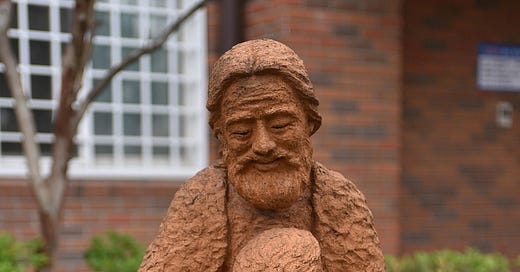In 1711 a young British poet wrote a long essay about the literary critics who were often merciless in their attacks on writers. He urged the critics to help poets improve rather than attacking them. The essay was in perfect poetic style with over 740 lines, a prodigious work that brought much attention. Now 310 years later, only three lines have remained in the public mind. In the most memorable words of the poem, Alexander Pope urged the critics to be more understanding, “To err is human; To forgive, Divine.”[1]
Forgiveness is one of the most powerful choices we can ever make. It is also one of the most difficult. In this episode of Tracks for the Journey, I want to explore what forgiveness can do for us. The poet Alexander Pope may have written it is an act of God, but we must learn to make it a part of our life, too. Stay with me as we talk about forgiving those who have wronged us.
All of us have experienced wrongs that wound us. Can you think of yours? Some of you may instantly see the face of an abusive husband screaming. Others may see the laughter of cruel friends. Perhaps an unjust boss blamed you for something that was not your fault. Crime can leave bitterness festering in our soul for years. Are any of the painful memories from childhood? Think how many years ago that was, yet they linger!
Each of us should acknowledge that granting forgiveness is a battle. The wrongs we experience seem to demand that we get revenge! How sweet we think it would be to make that person suffer just like I have done! So we nurse our wound, enlarge our pain, rehearse our hurt. But we are the ones who suffer when we harbor anger and unforgiveness.
Medical research has shown that persons who are angry are more likely to have physical illness. There is an especially strong connection between anger and heart problems. A study at the University of Wisconsin showed that the patients who reported unforgiven episodes had a higher rate of heart disease than those who practiced forgiveness. Another study connected anger and immune system response. Even five minutes of anger affects immune responses for up to six hours![2] An old proverb says, ‘To choose revenge is to dig two graves.’ If we harbor our grievance, or lack of forgiveness, it will become a poison in our life!
In this season of Easter, the words of Jesus during his crucifixion are some of the most amazing in the Bible. “Father, forgive them.” The soldiers who had driven the iron spikes in his body heard him. The religious leaders who had pronounced him a heretic heard, too. His words were large enough to cover the entire nation and across the planet with a message that God’s love covered billions of souls with the good news of reconciliation.
What does forgiveness really mean? Stanford University’s Dr. Fred Luskin in his book Forgive For Good has some wisdom. Forgiveness is a skill we can learn. It is for your wellbeing primarily, not the person who has wronged you. It is a decision made by you alone to achieve peace within. As Dr. Luskin says, “Forgiveness does not change the past, but it changes the present. It means that even though you are wounded you choose to hurt and suffer less.”[3]
Don’t you think our world would be a better place if we choose to forgive someone today?
Thanks for reading this post! I welcome your comments and Restacks. Any Recommendations are appreciated! Find more resources for well-being at my website https://tracksforthejourney.com
[1] Alexander Pope, “An Essay on Criticism.” Poetry Foundation, October 13, 2009. https://www.poetryfoundation.org/articles/69379/an-essay-on-criticism
[2] Fred Luskin, Forgive for Good. Harper Books, 2002, p 87-88
[3] Ibid, p 68




